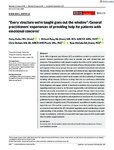“Every structure we're taught goes out the window”: General practitioners' experiences of providing help for patients with emotional concerns'
| dc.contributor.author | Parker, D | |
| dc.contributor.author | Byng, Richard | |
| dc.contributor.author | Dickens, C | |
| dc.contributor.author | McCabe, R | |
| dc.date.accessioned | 2021-09-17T11:58:39Z | |
| dc.date.issued | 2020-01 | |
| dc.identifier.issn | 0966-0410 | |
| dc.identifier.issn | 1365-2524 | |
| dc.identifier.uri | http://hdl.handle.net/10026.1/17813 | |
| dc.description.abstract |
Up to 40% of general practitioners (GP) consultations contain an emotional component. General practitioners (GPs) have to provide care with limited time and resources. This qualitative study aimed to explore how GPs care for patients experiencing emotional concerns within the constraints of busy clinical practice. Seven GPs participated in three focus groups. Groups were recorded, transcribed and analysed thematically. Three themes were identified. (a) Collaboratively negotiated diagnosis: How patients' emotional concerns are understood and managed is the result of a negotiation between patient and GP belief models and the availability of treatments including talking therapy. (b) Doctor as drug: Not only is a continuous relationship between GPs and patients therapeutic in its own right, it is also necessary to effectively diagnose and engage patients in treatment as patients may experience stigma regarding emotional concerns. (c) Personal responsibility and institutional pressure: GPs feel personally responsible for supporting patients through their care journey, however, they face barriers due to lack of time and pressure from guidelines. GPs are forced to prioritise high-risk patients and experience an emotional toll. In conclusion, guidelines focus on diagnosis and a stepped-care model, however, this assumes diagnosis is relatively straightforward. GPs and patients have different models of psychological distress. This and the experience of stigma mean that establishing rapport is an important step before the GP and patient negotiate openly and develop a shared understanding of the problem. This takes time and emotional resources to do well. Longer consultations, continuity of care and formal supervision for GPs could enable them to better support patients. | |
| dc.format.extent | 260-269 | |
| dc.format.medium | Print-Electronic | |
| dc.language | en | |
| dc.language.iso | en | |
| dc.publisher | Wiley | |
| dc.subject | Communication | |
| dc.subject | Doctor-patient relationship | |
| dc.subject | Mental health | |
| dc.subject | Patient-centred care | |
| dc.subject | Primary care | |
| dc.subject | Qualitative analysis | |
| dc.title | “Every structure we're taught goes out the window”: General practitioners' experiences of providing help for patients with emotional concerns' | |
| dc.type | journal-article | |
| dc.type | Journal Article | |
| dc.type | Research Support, Non-U.S. Gov't | |
| plymouth.author-url | https://www.webofscience.com/api/gateway?GWVersion=2&SrcApp=PARTNER_APP&SrcAuth=LinksAMR&KeyUT=WOS:000490419400001&DestLinkType=FullRecord&DestApp=ALL_WOS&UsrCustomerID=11bb513d99f797142bcfeffcc58ea008 | |
| plymouth.issue | 1 | |
| plymouth.volume | 28 | |
| plymouth.publication-status | Published | |
| plymouth.journal | Health and Social Care in the Community | |
| dc.identifier.doi | 10.1111/hsc.12860 | |
| plymouth.organisational-group | /Plymouth | |
| plymouth.organisational-group | /Plymouth/Faculty of Health | |
| plymouth.organisational-group | /Plymouth/Faculty of Health/Peninsula Medical School | |
| plymouth.organisational-group | /Plymouth/REF 2021 Researchers by UoA | |
| plymouth.organisational-group | /Plymouth/REF 2021 Researchers by UoA/UoA03 Allied Health Professions, Dentistry, Nursing and Pharmacy | |
| plymouth.organisational-group | /Plymouth/Research Groups | |
| plymouth.organisational-group | /Plymouth/Research Groups/FoH - Community and Primary Care | |
| plymouth.organisational-group | /Plymouth/Research Groups/Institute of Health and Community | |
| plymouth.organisational-group | /Plymouth/Research Groups/Institute of Translational and Stratified Medicine (ITSMED) | |
| plymouth.organisational-group | /Plymouth/Research Groups/Institute of Translational and Stratified Medicine (ITSMED)/CCT&PS | |
| plymouth.organisational-group | /Plymouth/Research Groups/Plymouth Institute of Health and Care Research (PIHR) | |
| plymouth.organisational-group | /Plymouth/Users by role | |
| plymouth.organisational-group | /Plymouth/Users by role/Academics | |
| dc.publisher.place | England | |
| dcterms.dateAccepted | 2019-09-03 | |
| dc.rights.embargodate | 2021-9-18 | |
| dc.identifier.eissn | 1365-2524 | |
| dc.rights.embargoperiod | Not known | |
| rioxxterms.versionofrecord | 10.1111/hsc.12860 | |
| rioxxterms.licenseref.uri | http://www.rioxx.net/licenses/all-rights-reserved | |
| rioxxterms.licenseref.startdate | 2020-01 | |
| rioxxterms.type | Journal Article/Review |


